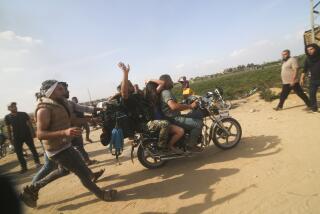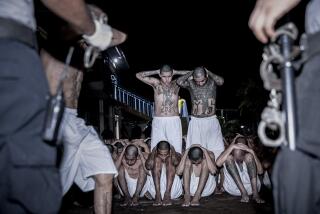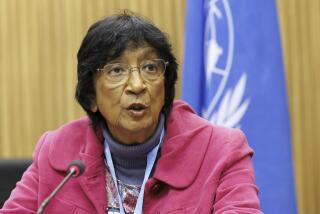Rape Is Among Abuses in Sudan, Report Finds
- Share via
JOHANNESBURG — Women and girls in the Darfur region of western Sudan have been systematically raped by rampaging Arab militias, according to a report released Monday by the human rights group Amnesty International.
Victims and witnesses described how members of the militias, known as janjaweed, sang as they raped women and girls as young as 8, broke women’s legs to prevent their escape and raped or brutally killed pregnant women.
According to an account from an unidentified woman in the village of Garsila, a pregnant 18-year-old named Aziza died after militiamen slit open her belly, saying her baby would be a child of the enemy.
Amnesty International said it had documented the names of 250 rape victims and collected information on another 250. Given the silence and shame attached to rape in these communities, it concluded that the 500 cases were a small fraction of the total.
“When we tried to escape, they shot more children,” a 37-year-old witness from the village of Mukjar, who was identified only by the initial A, said in the report. “I saw many cases of janjaweed raping women and girls. They are happy when they rape. They sing when they rape, and they say that we are just slaves and they can do with us what they wish.”
The report said that “many of the crimes committed in Darfur constitute war crimes or crimes against humanity.” It linked the militias to the Sudanese military, saying the soldiers appear to have coordinated attacks on the Fur, Masalit and Zaghawa tribes.
New-York based Human Rights Watch said Monday that there was clear evidence of links between Sudanese authorities and janjaweed. The group said it had documents from government officials in North and South Darfur dated in February and March calling for military support, including “provisions and ammunition,” for janjaweed militia leaders and pro-government tribes.
The Sudanese government, under intense international pressure, has pledged to rein in and disarm the Arab militias. It has repeatedly denied allegations by aid and human rights groups that it backs the militias.
A Sudanese news agency that is close to the government reported Monday that 10 janjaweed militia leaders who had led the attacks in Darfur were convicted in a court in Nyala and would face amputations of a hand and foot as well as six years in prison. The men were charged with crimes such as assault, murder, illegal possession of weapons and robbery, according to the Sudan Media Center, which distributes government statements.
More than a million people in Darfur have fled their villages because of janjaweed attacks, and face disease and starvation in camps without adequate food or clean water. Some fled to neighboring Chad, and others are clustered around towns in Darfur. The U.S. Agency for International Development has said that 300,000 people could die in coming months.
The conflict began last year when rebels from Darfur rose up in a bid for a greater share of the nation’s oil wealth. Pro-government Arab militias struck back in a campaign of terrorism aimed mainly at civilians, forcing people from their villages, burning houses, stealing livestock, killing villagers and raping women and girls.
In Darfur, rape victims are often rejected by their husbands because they are deemed unfit for marriage and ostracized by their communities. Even if the women are accepted, any child born of rape is seen as an enemy and rejected by the community.
The Amnesty International report quoted a 66-year-old farmer from Um Baru describing multiple rapes of a 12-year-old and an 18-year-old. He said a teacher had told him that militiamen broke her leg after raping her.
Another woman from the same village said militiamen broke the legs of women and girls to prevent them from running away.
A pregnant woman from Silaya, near Kulbus, said she was among a group of women and girls as young as 8 abducted by janjaweed militias and gang-raped.
“Five to six men would rape us in rounds, one after another for hours during six days, every night. My husband could not forgive me after this. He disowned me,” she said.
The report said government forces were either involved in or had witnessed almost all the attacks described.
“Notwithstanding the promises of the government of Sudan, the impunity allowed to the janjaweed militias to rape has not changed,” the report said.
“The horrific nature and scale of the violence inflicted on entire groups in Darfur appears to be a form of collective punishment of a population whose members have taken up arms against the central government,” the report concluded.
It said that although the attacks might be interpreted as a campaign to wipe out particular ethnic groups, the evidence on this was inconclusive. It called for an international commission of inquiry into the attacks.
More to Read
Sign up for Essential California
The most important California stories and recommendations in your inbox every morning.
You may occasionally receive promotional content from the Los Angeles Times.










